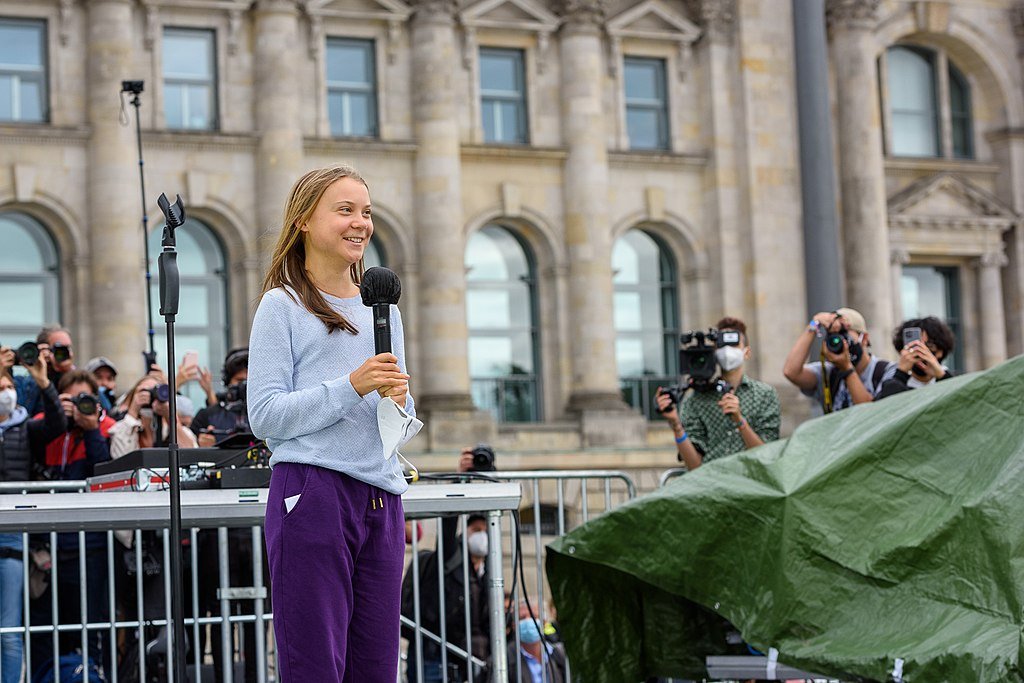“I came for a demonstration, not a political view”: Following Greta Thunberg’s disrupted climate rally, do climate activism and political activism go hand in hand?
Photo Courtesy: Stefan Müller (climate stuff, 1 Mio views), CC BY 2.0, via Wikimedia Commons
Last Monday, Greta Thunberg took part in a climate justice protest in Amsterdam. As she was highlighting that people on the front lines of the climate crisis were disproportionately experiencing its consequences, notably because of international governments’ inaction, she was rudely interrupted by a man who snatched her microphone away from her. And to say what? “I came for a demonstration, not a political view”. This begs the question; is climate activism apolitical?
When hearing about climate change and the matter’s urgency, it is not rare to hear the argument that we are all in this together, that this fight is everyone’s for it involves all of us who live on Earth. Does it though? Are we all affected by climate change? Surely not. It can hardly be ignored that inhabitants of the Southern hemisphere are disproportionately affected by the climate crisis. Yeb Saño, the executive director of Greenpeace Southeast Asia, notably highlighted that “a very wealthy and very small minority of the world's countries and corporations have been the principal cause of climate change, while the adverse effects of the climate crisis fall first and foremost on the poorest majority”.
Switching from a mainly Western narrative that centres the need to “save the planet” to one that underlines the need to save its inhabitants proves essential. The “save our planet” phrasing dis-incarnates the issue and its dire consequences on people. It also creates an inaccurate parallelism between the struggles of Western countries and that of others’, overlooking the radical action-power imbalance in the face of climate change, as well as the scale at which it affects different geographical areas. A tepid, abstract defence of the Earth needs to be replaced by addressing the ways climate change reflects fundamental power dynamics between the North and the South, the (ex?) coloniser and the colonised, the rich and the poor. In that regard, Greta’s invitation of two women, one Afghan and one Palestinian, is meaningful for it makes space for usually silenced voices, emphasising the significance of lived-experience testimonies for policy-making choices and epistemological practices.
“All animals are equal, but some are more equal than others”. Concepts of climate justice, environmental racism and systemic inequalities are essential to understand the fundamentally contrasting challenges that people from different countries are facing vis-a-vis the climate crisis. For example, the fight for climate justice is intrinsically linked to that against neocolonialism insofar as the colonised lands have often been poisoned by colonisers (eg: chlordecone in the Antilles), forced to adopt monoculture farming that destroyed local communities’ sustainable and diverse agricultural practices, thus largely contributing to soil degradation and famine crises. To quote what protesters resumed chanting after the man so indecorously interrupted Greta: there is no climate justice on occupied land.
Similarly, ActionAid points out that women are more affected by environmental crises than men since they are overexposed to their consequences ranging from gender-based violence in the aftermaths of catastrophes to reduced healthcare access. Women are also more dependent on land for their food and income and less likely to be in decision-making positions to take resilient actions.
The fight against climate change is, by essence, political as well as intersectional, and I feel tempted to say it comes as no surprise that it was a white man who interrupted Greta to deny it, seeing as, for many in the West (and not just white men), speaking out for the preservation of our environment is a choice that almost gets to exist in a vacuum, far from daily confrontations with the consequences of climate change and environmental racism/sexism. Fighting against climate change then seems like some good deed, an apolitical act seeking to preserve the quasi-abstract entity of “the planet”, rather than a daily struggle for survival and justice.

